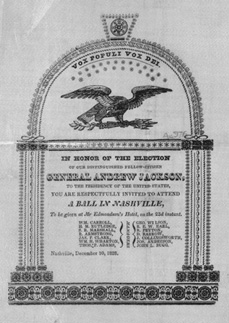
Source: Invitation to Tennessee Inauguration Ball, America’s Library. |
|
Jackson added to the power and distinction of the presidency. His election proved to Americans that their vote and voice mattered. Read below about how his presidency impacted the country.
The Impact of Jackson’s Presidency

Source: Invitation to Tennessee Inauguration Ball, America’s Library. |
|
In his first speech to Congress, he suggested getting rid of the Electoral College. During his presidency, Jackson used the veto power often. He also made policies without the approval of the Congress. Jackson’s major concern was removing barriers that kept farmers and small business owners from gaining a share of the nation’s wealth.
The Spoils System
Jackson also made changes regarding the people who held federal offices. Jackson believed that public offices and government duties should be rotated among supporters from the winning political party. This was called the spoils system, where those who supported his election received the “spoils,” or rewards, of a government position in return.
The Expansion of Voting Rights
Jackson’s presidency represented the ability for the common man to play an important role in American politics. A wave of expanded suffrage gripped the nation. By the early 1840s, the suffrage had been expanded to most adult white males, regardless of land ownership and wealth. Voting rights had also been extended to immigrant males declaring citizenship in some states.
Many states had eliminated the property and tax qualifications that had previously prevented many from voting. However, restrictions still remained against women and African Americans, with some states explicitly denying these groups the right to vote.
By 1858, free blacks were allowed to vote only in New Hampshire, Maine, Massachusetts, and Vermont.